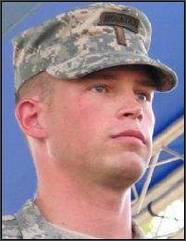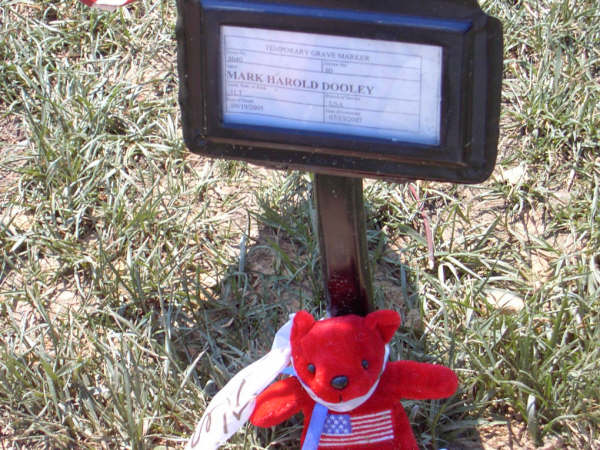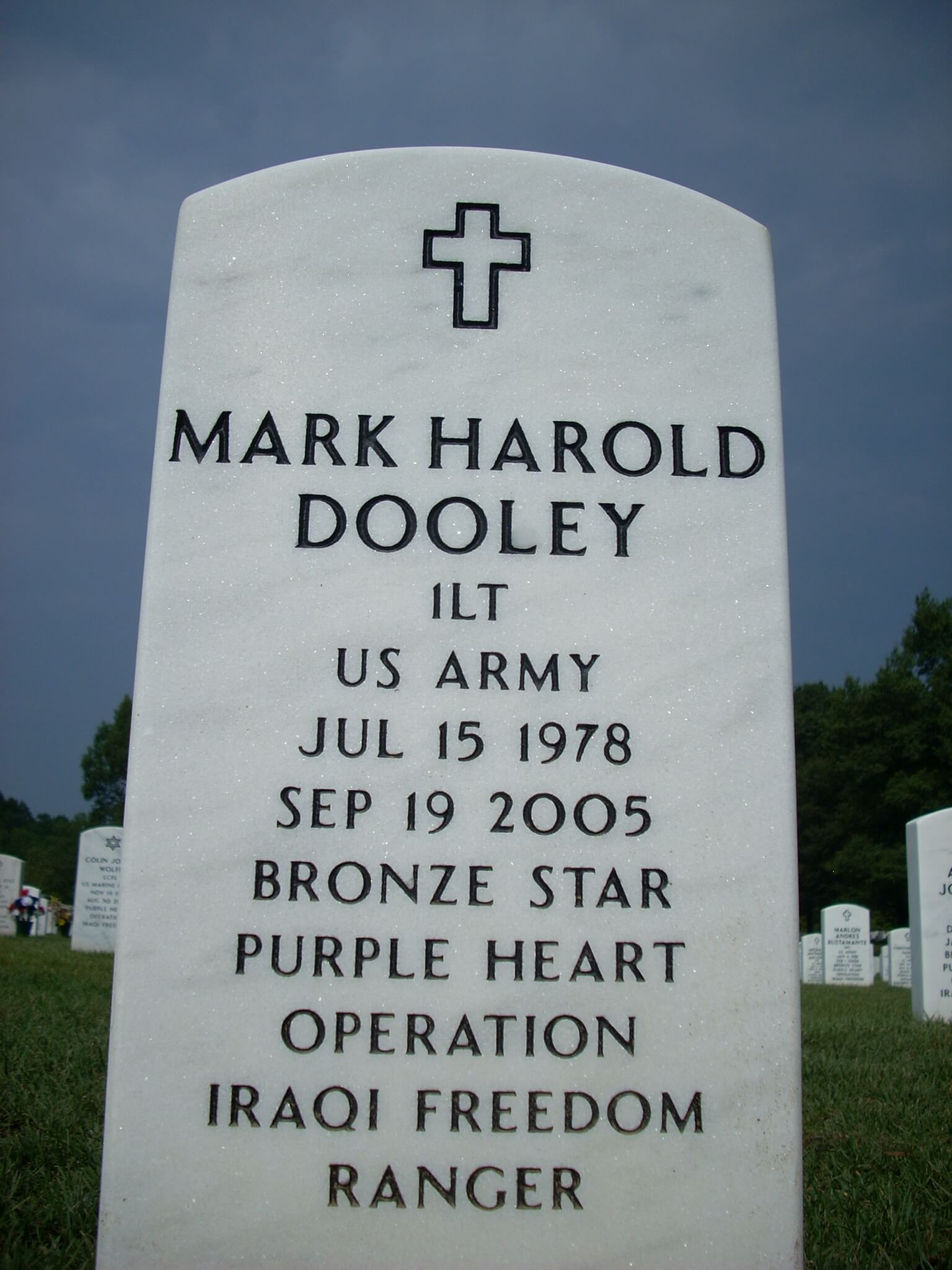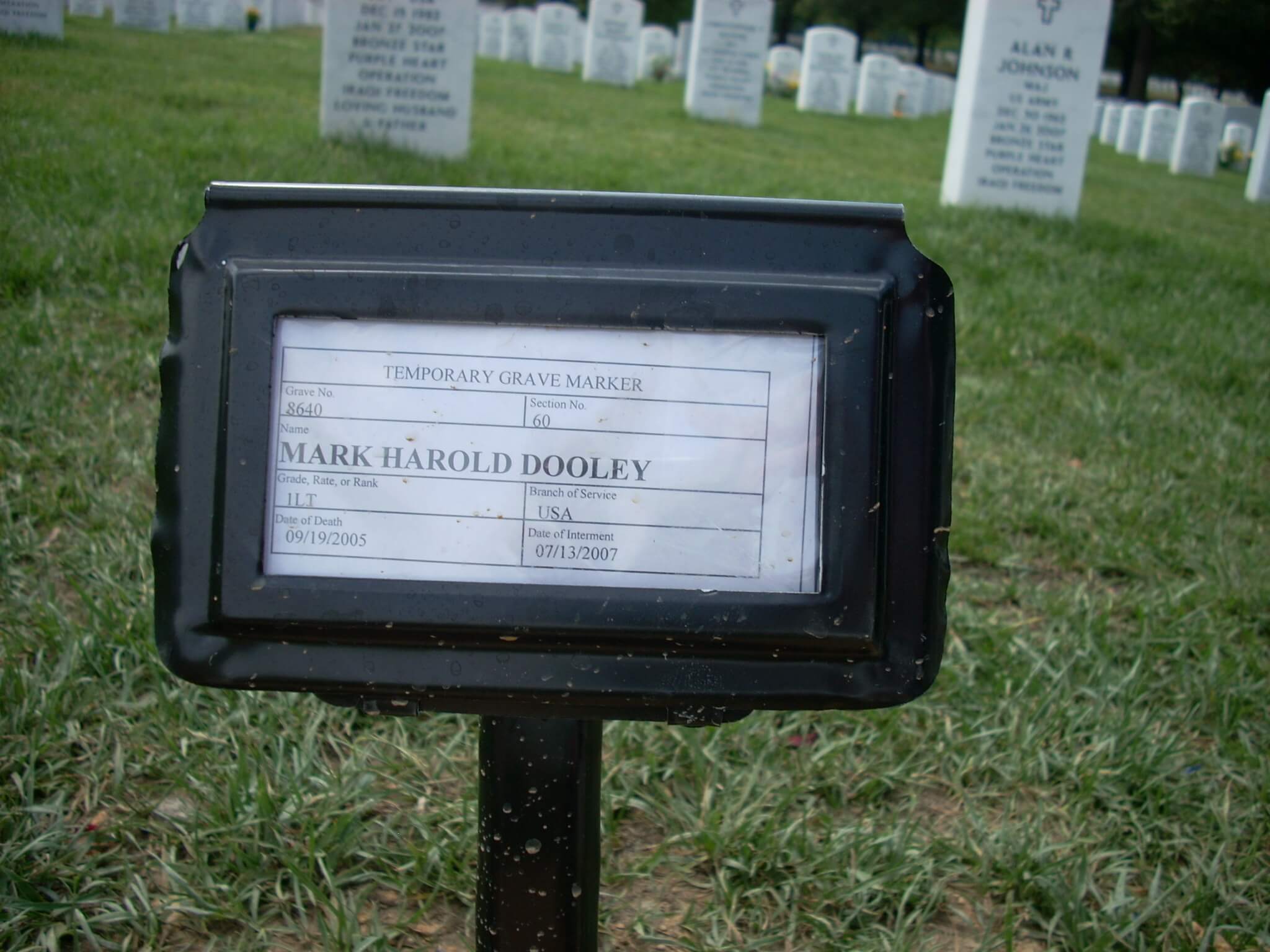U.S. Department of Defense
Office of the Assistant Secretary of Defense (Public Affairs)
News Release
IMMEDIATE RELEASE No. 954-05
September 21, 2005
DoD Identifies Army Casualties
The Department of Defense announced today the death of three soldiers who were supporting Operation Iraqi Freedom. They died in Ar Ramadi, Iraq, on September 19, 2005, when an improvised explosive device detonated near their vehicle during patrol operations.
Killed were:
- First Lieutenant Mark H. Dooley, 27, of Wallkill, New York. Dooley was assigned to the Army National Guard’s 3rd Battalion, 172nd Infantry Regiment (Mountain), 42nd Infantry Division, Jericho, Vermont.
- Sergeant Michael Egan, 36, of Philadelphia, Pennsyvlania. Egan was assigned to the Army National Guard’s 1st Squadron, 104th Cavalry Regiment, 28th Infantry Division, Philadelphia, Pennsylvania.
- Specialist William V. Fernandez, 37, of Reading, Pennsylvania. Fernandez was assigned to the Army National Guard’s 1st Squadron, 104th Cavalry Regiment, 28th Infantry Division, Philadelphia, Pennsylvania.
June 28, 2007
One of the fallen soldiers killed in the Iraq war will be the first with Vermont ties to be buried at Arlington National Cemetery. First Lieutenant Mark Dooley, 27, died in combat in western Iraq in September 2005. But there’s another Vermont connection.
The thousands of marble head stones that line Arlington National Cemetery are quarried and inscribed in Vermont. There are too many to count without resorting to extensive historical records.
Linda Beaudin, who stencils grave stones for Granite Industries of Vermont, said, “I don’t know how many thousands we’ve done for Arlington National Cemetery. And we did the only stone that went to Arlington national cemetery that was a Medal of Honor — for Paul Ray Smith.”
Paul Ray Smith is the only Iraq casualty who received the Medal of Honor to be buried at Arlington. Linda Beaudin did the stenciling work for him and countless others, from which the inscriptions are made.
“I’ve been doing it for 21 years,” she explained, “and I’m proud of what I do. And it’s kind of exciting sometimes, but sometimes it’s really sad.”
The stones go through a process beginning with huge slabs that are cut into the form of headstones. “They’re put on the big diamond saws and they’re cut in slabs,” she said. “And then they’re put on the line. The boys will put glue on, they’ll stick the stencil on, it goes through an automatic sand blast. There’s a hand sand blast at the end that they touch up anything to make sure the depth of the letters are good.”
Granite Industries of Vermont produces 80 to 90 headstones on any given day. Most go to Arlington or other national cemeteries. Some are private, some commissioned by the government for its soldiers, sailors, Marines and airmen who gave up their lives for the country.
Next month, Linda Beaudin will attend a burial ceremony for a fallen Vermonter who will be laid to rest at Arlington. That’s where Lieutenant Dooley will be buried, with full military honors, on July 13, 2007.
21 September 2005:
A Vermont Army National Guard soldier and Wilmington police officer, described as a dedicated young man with a promising future in the military and law enforcement, was killed Monday by a roadside bomb in Iraq.
Mark Dooley, a 27-year-old First Lieutenant, was investigating reports of suspicious activity in Ramadi with about 30 other soldiers when the bomb detonated. Although Dooley was wearing sophisticated body armor and riding in an armored vehicle, the blast killed him instantly, Vermont Guard commander Major General Martha Rainville said Tuesday.
“It’s a loss of a friend and a fellow soldier, and it’s a loss of a talented individual,” Rainville said during a news conference at Camp Johnson in Colchester. “He will be deeply missed.”
The explosion killed two other U.S. service members from units outside Vermont, Rainville said. The bomb blast occurred at about 7 p.m. in Iraq, or 11 a.m. Eastern Daylight Time.
Dooley’s parents, Peter and Marion Dooley, were notified of their son’s death at about 11:30 p.m. Monday at their home in Wallkill, NewYork, where Dooley grew up, Rainville said. Through the Guard, the family declined to comment.
The Wilmington Police Department hired Dooley as a patrol officer in mid-November, just two months before his Guard unit — the 3rd Battalion of the 172nd Mountain Infantry Regiment — left Vermont. He immediately impressed his co-workers and members of his new community, Chief Joseph Szarejko said.
“He thought he could make a difference, and I’m sure he would have,” Szarejko said in a phone interview, emotion apparent in his voice. “You don’t meet many people like Mark Dooley in a lifetime. I was looking forward to him coming back.”
The department’s officers wrapped black bands around their badges.
With his death Dooley became the 19th serviceman with Vermont ties to be killed in combat in Iraq since the war began in March 2003. A 20th soldier, Vermont Army National Guard Sergerant William Normandy, died of natural causes in Kuwait.
Dooley is the fifth member of the Vermont National Guard and the second from Task Force Saber to be killed in combat. Saber, whose 375 members left Vermont in January for training and arrived in Iraq in July, lost Master Sergeant Chris Chapin, 39, of Proctor to a sniper’s bullet Aug. 23 in a Ramadi suburb.
The yearlong mission was Dooley’s first deployment. The young officer had “super things to come” in the Guard, chief of staff Col. Jonathan Farnham said.
“A bright future, no doubt,” he said.
21 September 2005:
Vermont National Guard Lieutenant Mark H. Dooley, was riding in an armored Humvee as part of a patrol sent out to investigate suspicious activity when he was killed by a bomb, guard officials said.
Even though he was in the vehicle and wearing all his protective gear, he was killed instantly by the improvised explosive device in the Iraqi city of Ramadi, said guard commander Major General Martha Rainville.
Two other American service members were killed in the same attack, which took place at about 11 a.m. Eastern Time on Monday. Rainville did not say where the other soldiers were from.
“He was very well respected by his peers and his commanders,” said Rainville. “He will be deeply missed.”
Dooley, 27, of Wilmington was a member of the town’s police department for three months before his unit, the 3rd Battalion of the 172 Mountain Infantry Regiment, was called to active duty last January. He arrived in Iraq in July.
The Army listed his home of record as Wallkill, New York, where his parents, Peter and Marion Dooley, live.
Dooley’s death brings to 17 the number of American military service members with ties to Vermont who have died in Iraq since the war began. An 18th Vermonter died of natural causes in Kuwait while training to go to Iraq.
And Dooley was the second member of his unit, the 400-member Task Force Saber which arrived in Iraq in July, killed in Iraq. Sergeant First Class Chris Chapin, 39, of Proctor was killed by a sniper August 23, also in Ramadi.
Task Force Saber is a part of the 2nd Brigade Combat team of the 28th Division led by the Pennsylvania National Guard. Since the brigade arrived in Iraq in July 11 soldiers have been killed, Vermont Guard officials said.
The U.S. military said Tuesday that four U.S. soldiers died Monday in two roadside bombings near Ramadi and a fifth died in a blast north of Baghdad, pushing the toll of American forces killed in Iraq past 1,900.
Ramadi is a volatile city 70 miles west of Baghdad. It has been the scene of intense but sporadic fighting since the insurgency gained strength and began its offensive against U.S. forces in the summer of 2003.
Rainville and Chief of Staff Colonel Jonathan Farnham said insurgents fighting U.S. and coalition forces in Iraq were developing more powerful weapons.
“The uparmored humvees have protected a lot of soldiers,” Rainville said. The death of Dooley and the others “indicates the strength of the explosive used.”
She said the Iraqi insurgents were adapting their tactics and increasing the lethality of their weapons to counter U.S. advantages, Rainville said.
“We cannot underestimate the enemy,” Rainville said. “As they try tactics and methods they see what works and what doesn’t work.”
She said the U.S. military was doing the same thing.
“There is not a perfect protection for a soldier or an airman,” Rainville said. “Given time (the insurgents) will find a weakness.”
Rainville and Farnham, Dooley’s commander in Vermont, appeared grim-faced at the Tuesday afternoon news conference.
“We all have a job to do,” Rainville said. “This is a piece of that job that we take very seriously.”
They both said Dooley had a bright future in the National Guard.
Dooley joined the Wilmington Police Department last November and worked there until his deployment. In 2002 and 2003 he worked for the Windham County sheriff’s office.
Wilmington, a ski town, is located in southern Vermont west of Brattleboro.
Dooley is survived by his parents and a brother.
Governor James Douglas said Tuesday in a statement that he had contacted Dooley’s family and “expressed our most sincere condolences.”
Congressman Bernard Sanders also expressed his sadness.
“My thoughts are with his family at this difficult time and I join all Vermonters in offering my deepest condolences for their loss,” Sanders said.
As of Tuesday, 1,904 members of the U.S. military have died since the beginning of the war in 2003, according to an Associated Press count. At least 1,483 died from hostile action, according to the military. The figures include five military civilians.
1 October 2005:
The remains of Army First Lieutenant Mark H. Dooley lay in a flag-draped coffin yesterday, but his own words reverberated through the crowd gathered in his honor.
The words came from a letter Dooley wrote on his way to war and gave to his father, Peter, for safekeeping, only to be opened if he did not return.
“I knew right away what it was. I am going to read it to you,” Peter Dooley told the crowd at Christ the King Roman Catholic Church.
“It’s unusually hard to put down how you want people to remember you,” Mark wrote in his farewell letter.
“The finest moments in my life were when I realized that everything Dad had tried to help me avoid had come true. I always tried to think how you would have handled something,” Dooley read.
To his mother, Marion, he wrote that he hadn’t joined the battle out of some misguided allegiance, “but for our sacred honor.”
“Don’t be angry or let sadness dominate your heart,” the son wrote. “Be proud.”
Mark had advice for a younger sibling, also named Peter: “Remember, time is a gift.”
That was typical of Mark, his younger brother said. “He was always looking out for other people. Despite his great strength, his strongest muscle was his heart.”
More than 500 people, including 300 military and police, gathered yesterday to pay their respects to young soldier. He died in Ramadhi, Iraq, September 19 in an insurgent bomb attack. The Plattekill native, a 1997 graduate of Wallkill High School in Ulster County, was 27.
He is the 11th soldier from the mid-Hudson to die in connection with the Iraq conflict and the third from Ulster County.
Mark Dooley felt a duty to serve his country. That’s why he left his new job at the Wilmington, Vermont, Police Department, police Chief Joseph Szarejko said.
“He said he wanted to be there. That was what he had trained to do,” Szarejko said. “I told him to keep his head down. He said, ‘I’ll come back, chief.'”
When he left for Iraq, Mark put two photos on his desk, one of himself in his military uniform and one in his police uniform. He left a note, too.
“This is the desk of Patrolman Mark H. Dooley,” it said. The last line in the note: “All people deserve freedom.”
Hundreds of Vermont National Guardsmen filled an entire side of the church. Bright rows of ribbons spanned their uniforms, just above their hearts. Mark Dooley was one of theirs, a member of the Vermont National Guard, a highly trained Army Ranger.
“He was an amazing and gifted officer,” said Lieutenant Colonel Jack Mosher, commander of the infantry to which Mark’s unit belonged. “The streets and alleyways of Ramadhi were Mark’s natural habitat. His time was now, and he knew it. He was ready.”
At a poolside celebration before he went to Iraq, Mosher quoted the young soldier: “I am not afraid to go, sir. I have people who love me.”
“From the turnout here today, you can see that is true,” Mosher said.
One of those friends is Lieutenant Ryan Anderson, who wondered what Mark would have advised him about his eulogy.
“I think he would have said, ‘Suck it up and drive on.’ He would have said, ‘Follow me. I’ve got your back.'”
“Well,” Anderson said, looking down at his friend’s coffin. “You have defended your position with honor. You are relieved. Now follow me. I’ve got your back
30 May 2006:
President Bush, delivering a Memorial Day message surrounded by the graves of thousands of military dead, said the United States must continue fighting the war on terror in the names of those who already have given their lives in the cause.
“The best way to pay respect is to value why a sacrifice was made,” Bush said Monday, quoting from a letter that Lieutenant Mark Dooley wrote to his parents before he was killed last September in Ramadi, Iraq.
Noting that some 270 fighting men and women of the nearly 2,500 who have fallen since the terror attacks of September 11, 2001, are buried at Arlington National Cemetery, Bush said: “We have seen the costs in the war on terror that we fight today.
“I am in awe of the men and women who sacrifice for the freedom of the United States of America,” the president said, drawing a long standing ovation from the troops, families of the fallen and others gathered at the cemetery’s 5,000-seat white marble amphitheater.
“Here in the presence of veterans they fought with and loved ones whose pictures they carried, the fallen give silent witness to the price of liberty, and our nation honors them this day and every day,” he said.
The nation can best honor the dead by “defeating the terrorists . . . and by laying the foundation for a generation of peace,” Bush said.
Friday, June 29, 2007
First Lieutenant Mark Dooley had a way of honoring the people he respected by hanging photographs on the wall of his bedroom in Wallkill, New York.
In one corner, there are pictures of his family who served their country, going back to his great-great-great-great grandfather who fought in the Civil War.
Across the room hangs a photograph from Mogadishu, Somalia, of the American servicemen who died when their helicopter was shot down in October 1993.
Dooley understood sacrifice and did not want those memories to ever fade away.
Next month, Dooley’s name will be forever engraved in the the country’s memory when he is buried at Arlington National Cemetery in Arlington, Virginia.
Dooley, who was a member of the Wilmington Police Department and the Windham County Sheriff’s Department, was killed west of Ramadi, Iraq, on September 19, 2005, when the scout platoon he was leading was ambushed.
Dooley’s body was cremated and for the past year-and-a-half his family did not want to let him go, his mother Marion said Thursday.
All of the photographs still hang in his bedroom, and his mother said it is time.
On July 13, two days before what would have been his 29th birthday, at 2:30 p.m., a caisson will carry Dooley’s remains to his final resting place at Arlington National Cemetery, outside the nation’s capital.
“I feel like it is the culmination of everything,” Marion Dooley said. “Mark has been with us and we couldn’t stand to part with him. Now he is going to a place where we know they will care for him forever.”
It took a while for the family to decide to send Mark’s remains to Arlington, Virginia.
On Memorial Day 2006, President George W. Bush quoted Mark in a speech at Arlington.
“Before he left for his tour, he gave his parents a last letter, just in case,” Bush told the crowd. “He wrote, “Remember that my leaving was in the service of something that we loved, and be proud. The best way to pay respect is to value why a sacrifice was made.'”
On that day, Marion said, they decided that Mark should be buried at Arlington.
“He would really be proud,” she said. “Mark understood what it meant to honor someone.”
Mark Dooley graduated from Norwich University and also graduated from the Army’s Ranger School.
He was a member of the 3rd Battalion, 172nd Mountain Infantry.
In July, a busload of Vermonters plan to travel down to Arlington for the ceremony.
His mother said that Mark used to joke that he was never allowed to go to the zoo and so she said she is going to take his ashes to the National Zoo before letting them go.
Vermonter, killed in Iraq, is buried with honors
EVAN LEHMANN, Banner Washington Bureau
14 July 2007
Mark Dooley foretold his death. It was months before he wheeled into the nighttime explosion that proved his premonition.
At a wedding almost a year before a makeshift bomb killed him on September 19, 2005 outside Ramadi, Iraq, the first lieutenant from Wilmington told his brother he wouldn’t return home alive.
“It was hard for me to think he could die,” his brother, Peter, recalled Friday, hours before Dooley’s ashes were drawn by a six-horse team to gravesite No. 8640 in Arlington National Cemetery.
“He’s in the right company.”
Just as Dooley led his unit into the darkness that night he died, chasing after insurgents spotted nearby, the man who will turn 29 in death on Sunday is leading Vermont service members again. He is the first Green Mountain man killed in Iraq to be buried in the national cemetery along the Potomac.
That decision did not come easily. For nearly two years, his family kept him close. They decided tentatively on interring him near the family house on Cape Cod. It wasn’t right.
“The hard part was parting with him,” said his mother, Marion, as she walked toward the bus in which Dooley’s ashes were being kept before the ceremony.
An Arlington burial ensures the separation will be temporary. She and Dooley’s father, Peter, a retired lieutenant colonel in the New York Air National Guard, plan to be buried in the sprawling cemetery that unfolds under view of the Washington Monument.
“We can be all together,” Marion Dooley said.
Dooley is a former police officer with the Wilmington Police Department and the Windham County Sheriff’s Department. He was a uniformed man, and graduated from Norwich University, a military school.
His friends call him Dooley, even in death.
“People enjoy life around him,” Amelia Gilman, 24, of Cornish, New Hampshire, said tearfully. “The thing I like most about Mark is the person you get to be when you were around him.”
She met Dooley through her sister’s husband, Second Lieutenant Mark Procopio of Stowe. He died in Iraq six weeks after Dooley during a mission to rescue two pilots shot down in a Cobra attack helicopter.
The mother of one of those pilots, Marine Major Michael Martino, was at Arlington to offer support, and receive it, from a group of grieving strangers who’ve formed a close bond through the death of sons and husbands.
Her son is buried near Dooley, in Arlington’s Section 60, a revered 624-acre area criss-crossed with white headstones, marking conflicts like World War II, Somalia, and the first Gulf War.
“Long after we’re gone…they’ll be remembered,” Sybil Martino said of her son and those that surround him.
Section 60 has been made famous by its newest residents: Americans killed in Iraq and Afghanistan. Dooley became the 349th to be buried among the section’s slight hills and dips and sweet gum trees.
Dooley’s interment was one of about 30 on Friday, an average day. Two of those burials were for service members killed in Iraq.
Away from Dooley’s ceremony, a distant brass band marked another. In the other direction, a firing party’s three successive gunshots revealed yet another.
Marion Dooley seemed comforted by her son’s surroundings.
“We know that our nation will be guarding you,” she wrote in a letter to her son. “As long as our nation endures we know you are being cared for in this sacred location.”
Dooley’s ceremony was marked by a procession of about 100 Vermonters, including 11 families of Green Mountain men who’ve died in Iraq and Afghanistan. It had the effect of a solemn parade.
“It’s going to be a difficult day,” said Marion Gray, whose son, Jamie, of Montpelier, was killed in June 2004. “We probably all would like our sons here, but selfishly we don’t want them so far (away).”
The Dooley family received two flags on Friday. One covered their son’s coffin; another flew over the Capitol, and was presented to them prior to the ceremony by the state’s congressional delegation: Senators Patrick Leahy (D), Bernard Sanders (I), and Representative Peter Welch (D).
The last time Leahy attended a Vermonter’s funeral at Arlington dated back to 1991, a casualty of the first Gulf War. Before that, it was Vietnam.
Before Dooley was buried, his mother offered a spontaneous eulogy without realizing it. It spoke of her son’s enthusiasm, risk-taking, and leadership.
She and the family had walked inconveniently into a dead end within the sprawling cemetery, blocked by a wrought iron gate. Someone suggested jumping it.
“Mark would,” Marion Dooley said.
The family followed a different route.
Letting Go, Nearly 2 Years After Loss
By Mark Berman
Courtesy of the Washington Post
Saturday, July 14, 2007
Before First Lieutenant Mark H. Dooley left for Iraq, he gave his father a letter for his family to open if he didn’t come home.
“The best way to pay respect is to value why a sacrifice was made,” he wrote. “Remember that my leaving was in the service of something that we loved.”
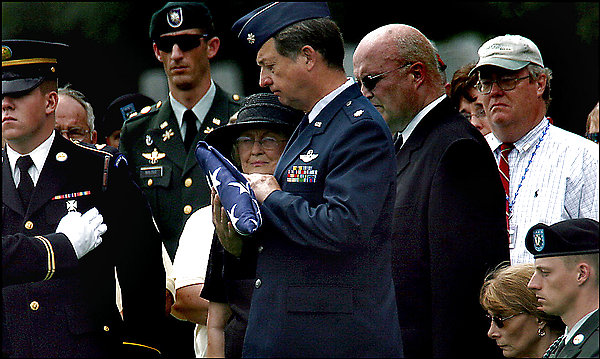
Yesterday, more than 100 mourners gathered at Arlington National Cemetery to pay tribute to Dooley nearly two years after he died. On September 19, 2005, Dooley, 27, of Wallkill, New York, was killed in Ramadi, Iraq, when a makeshift bomb exploded near his patrol vehicle, according to the Defense Department.
The crowd followed a horse-drawn caisson as it carried Dooley’s cremated remains to his grave, where they were placed in front of two framed collages tracing his life. One collage focused on Dooley in his youth; the other showcased him as a young adult.
Dooley’s letter, which was posted online, was quoted by President Bush when he spoke at Arlington Cemetery on Memorial Day 2006. Now Dooley was being laid to rest at the same cemetery where the president had invoked his name, becoming the 349th member of the military killed in Iraq to be buried there.
Although Dooley was killed nearly two years ago, his family did not want to let him go, his mother, Marion, told the Brattleboro (Vermont) Reformer.
“Mark has been with us, and we couldn’t stand to part with him,” she said. “Now he is going to a place where we know they will take care of him forever.”
She told the newspaper that the day Bush referred to Dooley, family members decided he should be buried at Arlington. They took him there two days shy of what would have been his 29th birthday.
Dooley was a member of the Vermont Army National Guard’s 3rd Battalion, 172nd Infantry Regiment (Mountain), 42nd Infantry Division, based at Jericho, Vt. Two soldiers from another infantry division were killed alongside Dooley. They were Sergeant Michael Egan, 36, of Philadelphia and Specialist William V. Fernandez, 37, of Reading, Pennsylvania.
In Dooley’s letter to his family, he praised his father’s example and apologized to his mother for his absence, telling them that “time will ease pain.” He wrote that he didn’t leave them in the service of something abstract, such as a flag or a foreign government’s success, but for “our sacred honor.”
Dooley graduated from Wallkill Senior High School and Norwich University, a Vermont military college. He was a law enforcement officer in Vermont, first with the Windham County Sheriff’s Department, then with the Wilmington Police Department.
“The guy always had a smile on his face,” Wilmington Police Chief Joseph Szarejko said. “He was very capable, confident in his abilities, was great around the office. Everybody liked him.”
Dooley had let the police department know that he could be called up, because he was a “stand-up kind of guy,” Szarejko said. “Mark was the kind of guy who was worth waiting for.”
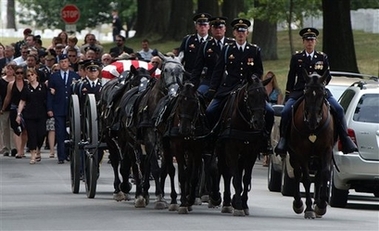
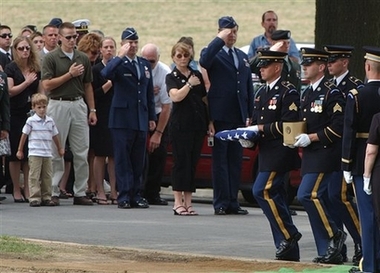
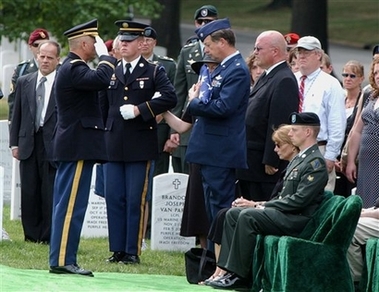
Michael Robert Patterson was born in Arlington and is the son of a former officer of the US Army. So it was no wonder that sooner or later his interests drew him to American history and especially to American military history. Many of his articles can be found on renowned portals like the New York Times, Washingtonpost or Wikipedia.
Reviewed by: Michael Howard

